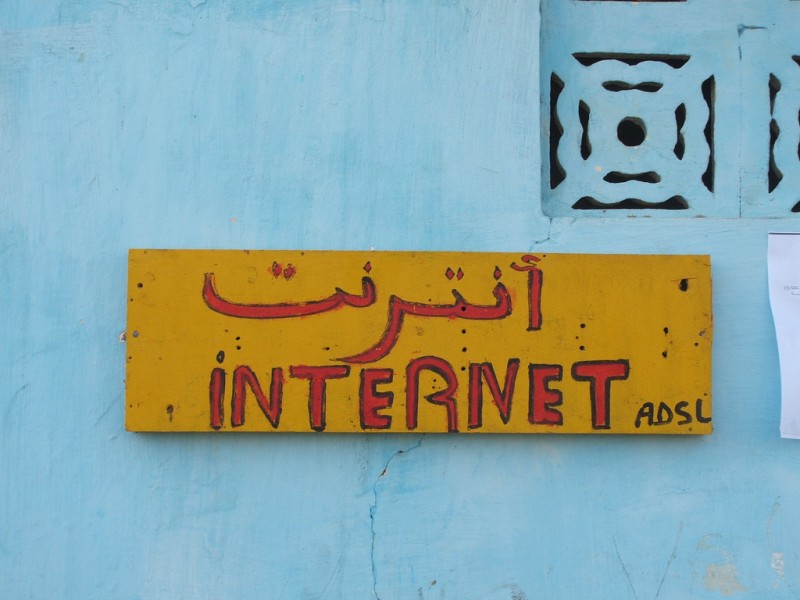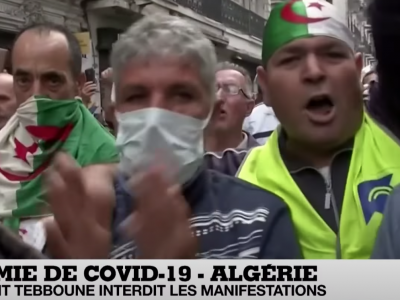Digital Citizen is a biweekly review of news, policy, and research on human rights and technology in the Arab World.
Algeria
Zoulikha Belarbi, an activist and human rights defender was arrested on 20 October in Tlemcen, western Algeria by local police, after publishing on her Facebook page a caricature of the Algerian president Bouteflika. The activist spent the night at the central police station of Tlemcen before being presented to the public prosecutor on Wednesday afternoon. Her laptop, phone and SIM card were confiscated, she told Al-Watan newspaper. She was released and placed under judicial supervision by an investigating judge. The picture that the activist published is from the famous Turkish series “Harim Sultan” with the faces of the main characters replaced by those of Algerian politicians: president Abdelaziz Bouteflika; his brother, the Prime Minister Abdelmalek Sellal; and the Secretary General of the FLN ruling party. The young activist told the newspaper El-Watan: “I’m not afraid, I will continue to fight with my colleagues for a free and independent Algeria.”
Egypt
According to local media reports, police on 7 October stormed the offices of the privately-owned Masr Al-Arabiya news website, confiscating equipment and interrogating staff members. However, the site’s chief editor Mahmoud al-Naggar denied these reports saying that it was just “a routine inspection” to search for pirated software.
Since early October, many users have been reporting that they are unable to use VoIP services on Skype, Viber and WhatsApp. The country’s telecommunication industry regulator, the National Telecommunication Regulatory Authority (NTRA) denied the blocking, while ISPs have been telling users that the blocking was ordered by the NTRA. On Facebook, digital rights activist Amr Gharbeia wrote that VoIP calls via Skype have been blocked in Egypt since 2010, while they were only blocked on WhatsApp during the first week of October.
A military court sentenced user Amr Nohan to three years in jail for putting Mickey Mouse ears on president Abdel Fattah El-Sisi and posting the photo on Facebook.
Kuwait
Kuwaiti netizens slammed a bill submitted to the parliament by the government cabinet to regulate online media. According to an official at the ministry of information, the bill will not apply to content on social networking sites such as Facebook and Twitter, but is only meant to regulate “professional media work” such as online newspapers and channels, and private news agencies. The law will establish a licensing scheme for online media. Websites that do not abide by the law’s provisions would be fined between 3000 and 10 thousand kuwaiti dinars (10 thousand and 30 thousand USD) and blocked. The law further bans the spreading of content prohibited under the 2006 publication law such as religious blasphemy or criticism of the country’s ruler.
Lebanon
Digital rights in Lebanon record a setback as authorities prosecute a number of users for expressing themselves online. On 6 October, activist Michel Douaihy was released after spending 9 days in detention and fined 200 USD over a Facebook post critical of the country’s general security. While, al-Akhbar journalist Mohammad Nazzal was sentenced in absentia to six months in jail and a fine of US $633 over a Facebook post published two years ago in which he said: “the judicial system is as low as my shoes”.
In addition, SMEX recorded three other incidents against online free expression. On 13 October, the anti-cybercrime bureau summoned blogger and activist Zoulfikar Harakeh for investigation over a satirical video he published on facebook three weeks ago, in which he makes fun of a new song by Lebanese singer Mohamad Iskandar. A week earlier, blogger Khodor Salameh wrote that he was summoned by the same bureau for investigation over a post he published on Facebook, without specifying why. Another Al-Akhbar journalist, Mohammad Zbeeb, was questioned by a court in Beirut, for publishing on Facebook a copy of a cheque worth of 1.4 billion Lebanese pounds (more than 900 thousand US dollars) in name of interior minister Nouhad Machnouk. The minister filed a defamation complaint against Zbeeb.
Morocco
Ali Anouzla, journalist and editor of the news site Lakome, was awarded the 2015 Raif Badawi Award for courageous journalists. The International Media Alliance, which gives the award, described Anouzla as ‘one of the very few Moroccan journalists who does not practice self-censorship’, and ‘continuously crosses red lines’. Anouzla is facing up to 20 years in jail over a ‘terrorism apology’ in a politically motivated case that dates back to 2013. In that year, his site lakome.com was blocked by the Moroccan authorities, but in August 2015, Anouzla launched lakome2.com. Anouzla’s award comes as the government continues its crackdown on journalists and activists.
Oman
Omani blogger Muawiya al-Ruwahi was put on trial by the security court in the United Arab Emirates (UAE) on charges of “establishing and managing online accounts for the purpose of inciting hate and disrupting public order and social peace” and “ridiculing the State and its leaders,” Amnesty International reported on 1 October. Al-Rawahi was arrested on 23 February as he crossed the border to the UAE over his online criticism of the authorities and the rulers there.
Palestine
During the recent escalation of violence in Israel and Palestine, the Israeli government took action against content on Facebook and YouTube it claims incites violence. In a letter to Google, the Israeli Foreign Ministry claimed that these videos praise the “assailants and present Jews and Israel in a hateful and racist manner”. The Foreign Ministry also made contact with Facebook, officially requesting the takedown of content. Since then, Israelis havevandalized Facebook offices in Israel, claiming that Facebook didn’t comply with the government’s takedown requests and a pro-Israel group is threatening to sue Facebook for promoting terrorism. The Palestinian group Hamas is nowclaiming that a number of their Facebook pages and their YouTube channelhave been taken down since October 20th, blaming the takedowns on pressure from the Israeli Foreign Ministry.
Saudi Arabia
In the span of one week, the Specialized Criminal Court sentenced three human rights activists to long term prison sentences under a draconian counter-terrorism law. On 13 October, the court sentenced activist, Abdulaziz Abdulatif Alsonaidi, to eight years in prison and a travel ban upon release and a $13,300 fine for writing a petition, and insulting the King and inciting public opinion on twitter. A day later, Abdulrahman al-Hamid from the Saudi Civil and Political Rights Association (ACPRA) was sentenced to nine years in prison for charges that include inciting against public order, and setting up an unlicensed organization, the ACPRA. Al-Hamid was arrested in April 2014, a day after he posted a tweet accusing the interior minister of “repressing public freedoms and dignity” with a link to a petition calling for the minister’s trial. On 19 October, Abdulkareem al-Khoder, a co-founder of the ACPRA wassentenced to ten years in jail also over his human rights activities.
Syria
Technologist Bassel (Safadi) Khartabil was moved from Adra Prison, on the outskirts of Damascus, to an unknown location on October 4, prompting concern amongst activists as to his whereabouts. The move sparked a new wave of activism for the beleaguered open source software developer, who has been imprisoned since 2012. Wikimedia, Index on Censorship, Global Voices,EFF, and Creative Commons were among the organizations to call on Syrian authorities to disclose Khartabil’s whereabouts and ensure his immediate release.
Tunisia
After withdrawing a bill on the right to access information without any explanation in July, the government submitted a new version to the parliament on 21 September. Exemptions on the right to access information in this bill, are the subject of a disagreement between the government and the rights and liberties parliamentary commission. The commission only suggests three exemptions which are: security and national defense, international relations, and the protections of privacy. The government, however, argued for five more vague exemptions including the State’s economic interests or the legitimate commercial interests of others.
Yemen
The Mwatana Organization for Human Rights has called on the Houthi rebel group, which controls vast areas of the country, to stop targeting journalists and to reveal the whereabouts of at least 13 media workers abducted by the group. Mwatana also numbered 36 news websites blocked by the Houthis.
Citizen Lab released a report on information controls during the ongoing armed conflict in Yemen. Among several findings, the research confirms that filtering products by the Canadian company Netsweeper are being used to filter critical political content, independent media websites, and all URLs belonging to the Israeli (.il) top-level domain. This censorship is implemented by YemenNet, the state-owned ISP currently under the control of the Houthis.
New research
- MedMedia, an online digital library launched last year to support media reform processes in the Southern Mediterranean, has announced that 300 expert reports and legal documents are now available on its site.
- Citizen Lab has issued a new report mapping the proliferation of spy tool FinFisher.
In other news
- Two flaws have been discovered in the TrueCrypt disk encryption software program
- In Sudan, amid a government crackdown on the press Whatsapp is‘fuelling a sharing revolution’
- Facebook announces a new system for alerting users of ‘state sponsored’ hacking attempts.
- Privatizing censorship in fight against extremism is risk to press freedom,writes CPJ’s Courtney Radsch
From our partners
- Facebook’s real name policy puts speech before privacy, writes Global Voices Advocacy’s Ellery Biddle.
- EFF has launched Offline, a platform advocating for the release of jailed bloggers, online activists, and technologists.
Upcoming events
- The 4th Annual Arab Internet Governance Forum will be held in Beirut for the second year in a row, from December 17-18, 2015. Submit your proposal here [download].
Digital Citizen is brought to you by Advox, Access, APC, EFF, Social Media Exchange, and 7iber.com. This month’s report was researched, edited, and written by Afef Abrougui, Fahmi Albaheth, Dalia Othman, Thalia Rahme, Rim Hayat Chaif, and Jillian C. York and translated into Arabic by Lara AlMalakeh and French by Thalia Rahme.




